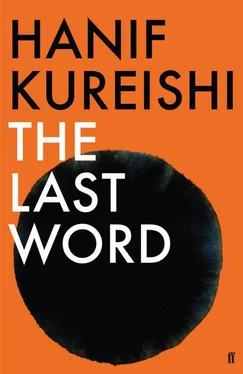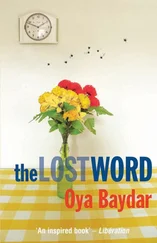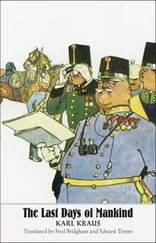He wrote about the hell within him with a new honesty and seriousness. This was when he became an ‘authentic’ artist. He was no longer standing to one side of himself, but said everything straight out. Harry said that no one described death as well as him, and how the mourning, isolation and deprivation made him mad.
Harry said, ‘Mamoon saw no one for eighteen months.’
‘No, no—’
‘Except — except what he describes as “his new family”. And he writes a lot about them in the journal I have.’
‘What? Who do you mean when you say family?’
With Peggy gone, Harry explained, it was the local woman, Ruth, attending to him. Because Mamoon couldn’t cope, and Peggy had insisted on it, Ruth moved into the house with her children, Julia and Scott, who was a teenager. He’d known the kids for years, of course. Peggy had always been aware how cruel Ruth was as a mother. So, when she was a child, Julia lived there for weeks on end during the holidays, hanging out with Peggy, making cakes, taking care of the animals, seeing the place as her home.
But now Mamoon became fond of them in a more adult, responsible way. He had never wanted crying babies or whinging toddlers. But now, to his surprise, he found he liked being a paternal figure. He enjoyed having authority and being relied on. The children taught him that the inside of his head wasn’t the only interesting thing in the world.
He discovered that he could be good fun, joking around as his parents did with him. But he was solicitous too; he saw what the kids needed as they got older. They ate together and watched sport and movies. The kids were used to seeing him sitting on the sofa scribbling in the notebooks. Ruth asked him if he wanted some peace. But no, he found he liked the everyday noises and the voices.
He even had a swimming pool dug for them and their friends, the locals, who came over to splash around. He drove Julia to school. She was moany, sullen, excitable, but perhaps he pitied her, or even liked her. He talked to her as he thought — his usual free association, about politics, his childhood, reading and writing — and she listened. He wrote a story and read it to her. He and Scott boxed together in the garden. Scott built bikes, and played with engines. When Scott was in big trouble with some of the locals, Mamoon went round and faced them down. Ruth kissed his feet.
Julia was the one Mamoon adored more and more. Appalled by her ignorance growing up in the country, he paid for her to have piano lessons, and to attend dance and art classes. He started to teach her Greek, and — quite mad this — made her read Homer and the Bible. He bought her classical records and sat with her while she listened to Mahler, and he was pleased when she wept, since it showed ‘sensitivity’. He promised he’d send her to college, but it didn’t happen. ‘I guess because he was with Liana by then,’ said Harry. ‘But I suspect he never stopped paying for her.’
‘Why would he do this?’ Alice said abruptly, ‘Oh no, he wasn’t going with Ruth, was he?’
‘He might have been. I don’t know yet. Though she wasn’t as far gone as she is now, she was drinking, and capable of violent despair.
Ruth was not entirely awful, or a halfwit, then. She was mightily enthusiastic at that point. She wanted everything, of course: love, the house, a future. . She thought she might get it if she served Mamoon. Then she made a mistake: she was not entirely self-serving. Maybe she understood what he really needed. Perhaps she cared for him. Harry said he thought she did. Maybe even now.
‘What happened?’ Alice asked.
Ruth had told Mamoon that enough was enough. There was no money coming in. He had to clean himself up and get on with his career. ‘My mother’, said Harry, ‘gave herself to her demons. They devoured her.’ But Mamoon resisted: he got up, he shaved off his long beard. Ruth cut his hair and kissed him. Instead of continuing to lay out his clothes for him every day, she packed his suitcase, and shoved him off to London to see his agent and his publisher. Meanwhile, he gave the family money, allowing them all to stay in the house while he was away. They loved it there: the space, the quiet, the isolation, and Julia regularly began to sit in that lovely library, leafing through books on art.
That was where the notebooks finished.
Harry told her that he’d worked out from Mamoon’s friends that under Ruth’s instruction Mamoon headed for London, where he found people talking about the new Britain made by immigration, and a younger generation who wrote about multiculturalism, ethnicity and identity. Mamoon had never thought about his identity. He had always been who he was. That was, conceivably, his problem. In London he couldn’t find anyone new to get along with, and his friends bored him. He tried to pick up women, but the charm was intermittent; he was too old and didactic, too needy, out of practice.
Because he couldn’t go back defeated, he pushed on. He travelled in Europe — Prague, Vienna, Madrid, Budapest, Ljubljana, Trieste — writing in hotel rooms, sitting in cafes alone with the newspaper and a notebook, as alienated as he had been as a student in Britain. He got on a train to Rome.
One day he found, at last, a woman, and brought her back — Liana. It was instant, magnetic, their attraction for one another. Their excitement was high.
Now, you can imagine it, Harry went on. Liana charging around Prospects House, amazed by everything she had married into, shouting, brightening the place up, throwing things out, putting up new curtains until everything was transformed. A new woman, a new world. An opening out. Ruth, Julia and Scott became ‘servants’ or ‘staff’ again. Mamoon had written ahead, instructing them to return to their house. Mamoon was no longer the surrogate father. He just dropped the family; everything was different. Mamoon was not a great explainer.
Scott was devastated, but what could he say? He still came to work in the garden, and did all the odd jobs. He slashed his legs until they ran with blood. He chased and beat the father of a Somali immigrant family with a cosh. But Mamoon continued to see Scott and listen to him; he was interested and firm, giving him guidance, but no money.
Liana, even today, had little idea of the family drama which took place before she arrived. Mamoon knew she would be too jealous. She would never have allowed the family to work at the house. ‘No woman would, frankly,’ said Harry.
‘But Harry, what you’re doing is forcing her to see all this — you’re pushing it in Liana’s face.’
He said, ‘Alice, I promise, this book will introduce her to things she had no idea about.’
‘But Liana is happy. Why disturb her? This is much too dangerous, Harry. I’ve said it all along.’
Harry told her that there was a peaceful passage coming up since, for a time at least, back in the house with his new wife, Mamoon was cheerful and optimistic. He wrote well and was happy to be alive.
‘Only for a time?’
‘Is he cheerful now, or is he restless again?’
‘How would I know? Oh God,’ she went on. ‘This book is going to give them nightmares. He’ll blame her. He can be tough, vicious even. Can’t we forget it and just be friends with them?’
‘I’m not being paid to be a friend.’
‘But they’re my friends now. They’ve done nothing but treat me with affection and kindness.’
‘Alice, I am warning you — keep your distance.’
‘What’s made you so brutal, Harry? I’m not staying long, but thank God I brought them some lovely things.’
Alice had been rushing around in London, finding tablecloths, glasses, cutlery, good vodka, earrings, hazelnut cake, and a print of a pig for Liana. After Alice and Harry had driven into the yard, and lugged the swag into the house, Alice made a fuss of the dogs. Eventually she and Liana sat down to gossip while examining the presents.
Читать дальше












